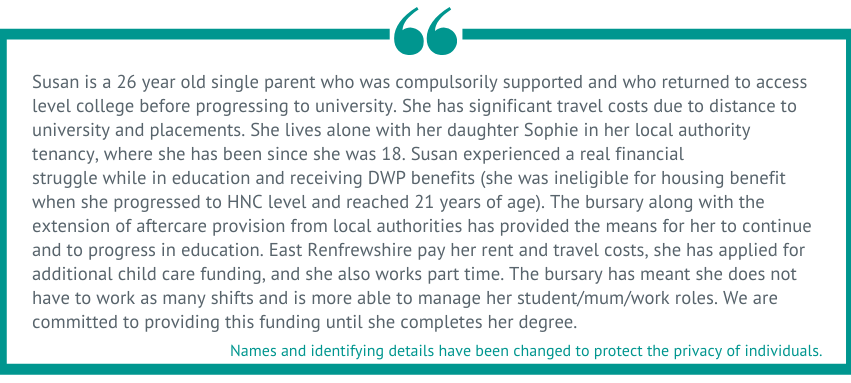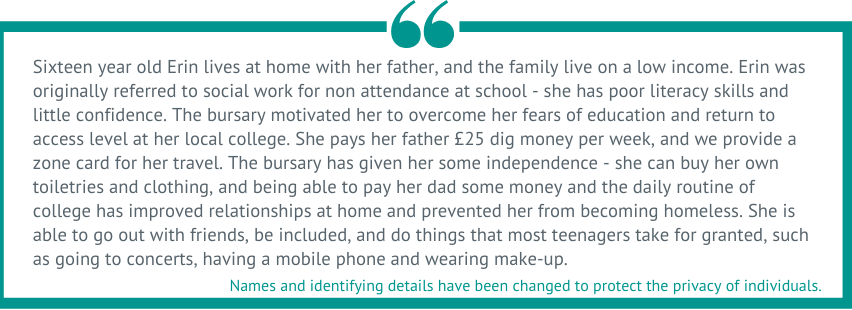The Care Experienced Student Bursary – helping to change lives in East Renfrewshire
Topic: Corporate parenting, Foster care, Local authority, Throughcare and aftercare, Voices of young people
Author: Katie Matthews
Katie Matthews is an Advance Practitioner in the youth intensive support service at East Renfrewshire Health and Social Care Partnership, which is responsible for the provision of through, continuing, and aftercare services for East Renfrewshire.
Having worked with care experienced young people for over 20 years, I have witnessed the significant barriers many face when they decide to return to or continue in further or higher education.
Over the years I've seen lots of positive changes in guidance, legislation and policy in Scotland, with the government, organisations and individuals striving to make a real difference to some of Scotland's most vulnerable young people. So when our team heard the news that care experienced young people were to be offered additional financial support from the Care Experienced Student Bursary (the bursary), we celebrated the government's recognition of the challenges faced by a very specific group of young people. The bursary is non-repayable for learners with care experience and was introduced in higher education in 2017/18 and in further education in 2018/19.
The bursary is in addition to other financial support for care experienced young people, helping to alleviate the worry and stress of how to cope financially and allowing the space for students to concentrate on their studies. It's great to see Scottish Government taking this seriously and providing guidance for local authorities to clarify how aftercare funding alongside the bursary should work in practice.

In East Renfrewshire we have tried to embrace the ethos behind the bursary while maintaining our financial responsibilities under Section 29 and Section 30 of the Children (Scotland) Act 1995, and Parts 10 and 11 of The Children and Young People (Scotland) Act 2014, not only to care leavers but to the expanding group of young people defined as care experienced.
The challenges for local authorities of providing help for care experienced young people are many, and the inconsistencies between local authorities are significant. This is not okay. Why must we categorise vulnerable young people so that they are (or are not) eligible for any form of funding or type of service, and what effect does this have on them?
The bursary helps many young people but does not level the playing field. Young people living alone in their own homes will experience more financial hardship that those currently looked after, continuing in care or in supported placements. There are some young people who receive the bursary who will also get their rent paid by a local authority and other young people who may find themselves living alone, with care experience but a local authority do not have the same financial duty. This was true prior to the introduction of the bursary, and in my opinion it shows that there is never a one size fits all when it comes to the needs of care leavers and care experienced young people.
The intensive support team supports our young students and I have witnessed how the bursary has been the incentive to try college again, with the means to join in and be included in all aspects of student life. The team has been able to take account of the individual needs of the young person, and their overall wellbeing, while trying to be as fair as possible.

The intensive support team supports our young students and I have witnessed how the bursary has been the incentive to try college again, with the means to join in and be included in all aspects of student life. The team has been able to take account of the individual needs of the young person, and their overall wellbeing, while trying to be as fair as possible.

The youth intensive support service is around when times are particularly tough; our aim is to help all our young people and their families to overcome barriers and work towards better choices and futures. The Care Experienced Bursary goes a long way to making this happen and ensuring a good education is a very real option for young people.
Scottish Government has recently sent guidance to all local authorities in the form a frequently asked questions document to support them to uphold the central principles of the bursary which are to enhance, rather than replace, existing support.
The views expressed in this blog post are those of the author/s and may not represent the views or opinions of CELCIS or our funders.
Commenting on the blog posts
Sharing comments and perspectives prompted by the posts on this blog are welcome. CELCIS operates a moderation process so your comment will not go live straight away.


